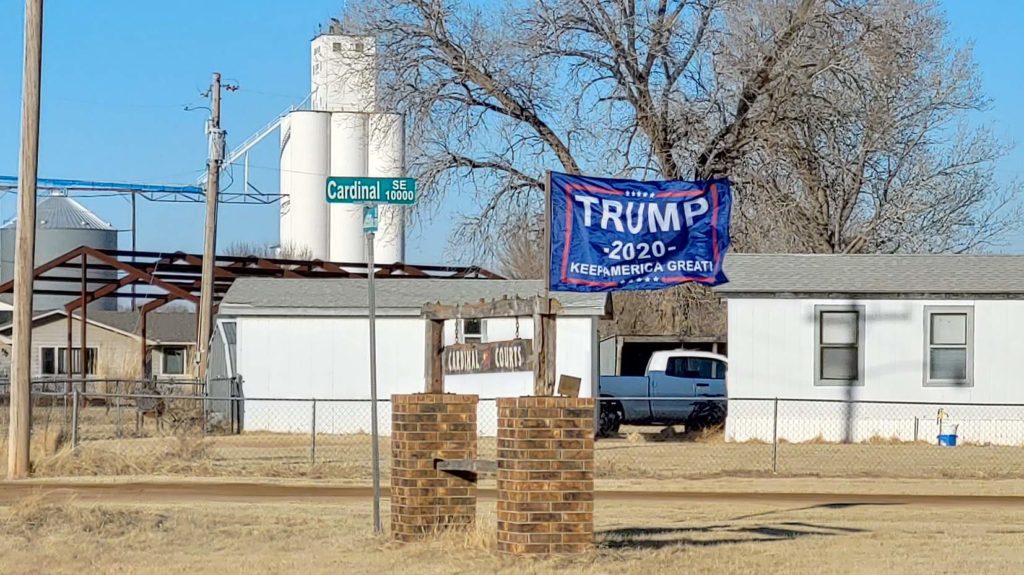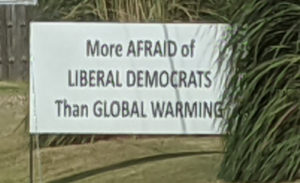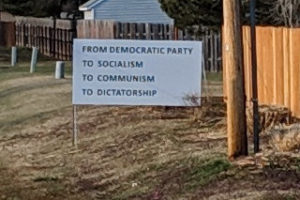There’s a Trump 2020 flag near my farm. It went up a couple of weeks ago, somewhere shortly after the president was impeached. I get to see it four times a day when I drive past to and from feeding cattle in the morning and evening.

In this part of the country, not-so-lovingly referred to as “Jesusland” by a close friend from the coast, support for the president isn’t uncommon. Thankfully, it’s still relatively rare to see public displays of support like flags and signs, but I’m guessing they’ll increase substantially between now and November.
In February 2017, I wrote about how the Trump administration was a backfire resulting from turning off the key of the long-running engine that was the GOP. It turns out it hasn’t been so much of a bang but more like dieseling — the way an engine turns in reverse for a while after running on bad gas or with bad timing. My old wheat truck does this all the time. The best thing to do to get it to quit is to put the truck in gear and apply the brakes.
There are many types of inequality in this country. Racial inequality has been a problem since before our nation was founded. It sadly continues to this day. Economic inequality is also nothing new but continues to worsen at an alarmingly exponential rate. But I think just as concerning and maybe even more fundamental is cultural inequality.
It’s the cultural divide that keeps us from agreeing on basic tenets of Americanism. Basic beliefs that I have held all my life are challenged by significant parts of this country in ways that seem as recent as they are surprising.
We’re the shining city on the hill that all should aspire to reach and look up to. Except we get upset when foreigners want to come here legally. Some of us get so wound up that we want to be as cruel as possible, even to those legally requesting asylum. We’re afraid that they have a different culture but we claim they commit crimes and take our jobs, but we’re immune to the facts that they commit far fewer crimes per capita than native-born citizens and that they have a hugely positive contribution to our economy.
In America, everyone is equal and all our voices should matter equally. But there are constantly pictures making the rounds on social media showing how much bigger the red parts of the country are than the blue parts as if acres mattered more than people…or if the weight of a vote depends on the distance to your closest neighbor. The people sharing these pictures are convinced that the culture of homogeneity of the flyover states is in danger of being invaded by a culture of diversity from the blue splotches on the map. They don’t understand or care that the the Electoral College and even the Senate, the original gerrymander, have become anti-democratic even if they were originally good ideas that functioned as training wheels at the start of our nation. They don’t care that a vote for a Kansas senator is worth less than 20% of a vote for a Wyoming senator.
Dad used to talk about how people who didn’t go to college are just different than those who did. Exposure to so many different cultures changes a person for the good.
I remember how one of my friends got upset by the use of the term “uneducated” to describe people without college degrees in the breakdown of the votes in the last presidential election. She was upset by what she heard as the implication that college is the only way to find knowledge, as if it meant people who didn’t attend college couldn’t be smart. It doesn’t — it’s simply shorthand for those who didn’t attend college.
However, there’s a far more useful implication from the “educated” versus “uneducated” shorthand that pollsters use to break down results. Americans who attend college have, in my experience, a far greater tolerance for different opinions. They don’t necessarily line up on one side of the political divide or the other, but on the aggregate I think they are more understanding and accepting of diversity. When they hold political and cultural beliefs, it’s usually a deliberate decision instead of the default positions that come from never leaving the echo chamber of home.
It’s the cultural divide that’s hurting our prosperity in this country. It’s why we keep our heads down in a small town. It’s why population is declining in rural America. It’s why population is increasing in urban America. Who wants to raise kids in a place that’s full of hammerheads who are unwilling to accept different ideas?
Just as racial and wealth inequality imply those at the top having privileges and opportunities not afforded those at the bottom, so too does cultural inequality. Cultural diversity is crucial to our collective future, but sadly there are significant parts of this country that are being left behind.
I have a neighbor who likes to make signs and put them up along a major highway.
Leaving aside the fact that Liberal Democrats is the name of a political party in the UK, he’s definitely more politically active than I am if perhaps not as diligent about word usage and capitalization. Another of his signs said something like “we live in a country of laws” and listed the Constitution AND Bill of Rights (the Bill of Rights is actually part of the Constitution) and also listed the Declaration of Independence, which actually isn’t a law at all. I admire his activism and engagement, but I wonder if he’s doing himself or our community any favors. Do passersby associate his views and lack of precision in language with the majority of our town? I hope not.



